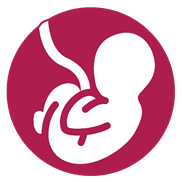If  you have found out you, or your partner, are pregnant you may be wondering what you should do next.
you have found out you, or your partner, are pregnant you may be wondering what you should do next.
Accessing the right care in pregnancy is important. There are many things you can do that will help to keep you and your baby safe and well.
It is important you look after the health and wellbeing of yourself, your family and the unborn baby over the months to come.
Pregnancy is often a time when people want to make positive changes to their lives. Midwives and Health Visitors are there to give you support and information.
There is a lot of information on the internet about pregnancy; it can be confusing. You will find a lot of information here on Just One Norfolk as well as links to other trusted websites.
Sign Up For NHS Antenatal Care
Once you have missed a period and had a positive pregnancy test you should get in touch with health services as soon as possible.
Call your GP surgery and tell them you are pregnant. If you do not have a GP, register with a local one.
You will need a booking appointment with your midwife, ideally before you are 10 weeks pregnant. You can do this yourself. If you have found out you are pregnant later than this, or are not sure how many weeks pregnant you are - they will make you an appointment as soon as they can.
Booking your midwifery appointments
If you have a long term condition or pre-existing medical condition that affects your physical and / or mental health, ask to see your GP before your booking appointment. You will be able to discuss how this can be best managed during your pregnancy.
Take Supplements
Eating a varied healthy diet with plenty of fruit and veg is always important and especially so in pregnancy.
Health experts recommend that some additional supplements are taken to help the growing baby develop healthily. Keep taking the advised supplements even if you are being sick.
You should only take vitamins specially made for those who are trying to get pregnant, or who are pregnant. This is because too much of some vitamins and minerals can harm your growing baby.
Folic acid
This helps the brain, spine and spinal cord develop healthily. It is recommended to take a supplement of Folic Acid (400mcgs) each day, whilst trying to get pregnant and until you are twelve weeks pregnant. If you were not able to do this then begin taking the supplement as soon as you find out you are pregnant.
Other Supplements
There are many pregnancy supplements available and you can ask your pharmacist for advice. ‘Maternal Healthy Start Vitamins’ include all the recommended supplements. They are available to buy at chemists.
If you are pregnant and on eligible benefits (and/or under 18 years of age) you may be able to get them free (and vouchers for milk, fruit and veg) via the Healthy Start Scheme.
Eat Well & Safely
When you are pregnant you do not need to eat lots of special foods, your baby will be well looked after by your body.
you are pregnant you do not need to eat lots of special foods, your baby will be well looked after by your body.
However it makes sense that you will feel better, and have more energy to keep active if you eat healthily whilst your body is growing a baby.
Some foods should be avoided during pregnancy because they can affect the growth and development of your baby.
Drink Well & Safely
Keeping hydrated is important during pregnancy. The advice is to drink 6-8 (200ml) glasses of fluid each day because;
 It reduces the risk of urine infection which are more common in pregnancy and can cause early births
It reduces the risk of urine infection which are more common in pregnancy and can cause early birthsAny non-alcoholic drink, hot or cold, is fine. But you should remember;
By the time you feel thirsty you may already be a little dehydrated so don’t ignore thirst. Keep an eye on the colour of your wee. It should be pale in colour; if it is dark you should increase your fluids.
No one really knows if there is a safe level of alcohol to drink during pregnancy. Importantly we do know it can cause long term health and development problems for babies and children if they are exposed to too much. Because of this when planning a pregnancy and during pregnancy it is safest to drink no alcohol.
If you worry that it might be hard for you to stop drinking alcohol talk to your GP, or midwife, as soon as possible - there are services to help you.
Be Smokefree
There is a lot of information about how harmful smoking is to us all. We know it is dangerous for unborn babies.
is a lot of information about how harmful smoking is to us all. We know it is dangerous for unborn babies.
One of the best things you can do for the health of your growing family and yourself is to be ‘smoke free’.
It is important that partners, family and friends understand that it is not just when the pregnant person smokes there is a risk to the unborn baby. All second hand smoke is dangerous.
What are the risks of being exposed to smoke in the womb?
Your growing baby;
You should try and quit smoking once you are planning a baby, or as soon you find out a baby is on the way to minimise the risk. If you haven’t already quit then stopping as soon as you can will still be the best decision for the health of your baby and for you!
If you are pregnant speak up for your baby to keep them safe and Smokefree. Ask others not to smoke around you or in places where you spend time.
Don’t be afraid to ask for help! You are four times more likely to stop successfully if you get help from a professional service.
If you, or a loved one, are pregnant you might feel worried that you will struggle to quit, and feel guilty and judged for smoking. Nicotine is very addictive – health professionals know it can be tough to stop; this is why there are free services to support you.
Be Active
Being an active family during pregnancy is good for you and your baby;

You may have been active before you found out you were pregnant. You may have decided to make a positive change to your life now you have a baby on the way. Being fitter will help make the early weeks and months of parenthood less tiring.
Things to remember to help you get or stay active;
New to exercise?
If you are new to exercise, expecting a baby can be a good motivator to get active. You should start slowly and build up. When you exercise you should be aiming to feel a little breathless but still be able to hold a conversation.
10 minutes at a time is a great start - build up to 30 minutes. Exercise with your partner or friends so that you can encourage each other to keep going.
If you feel worried and would like more advice you can speak to your midwife throughout your pregnancy and up to 28 days after the birth of your baby.
If you live in Norfolk
If you live in Suffolk